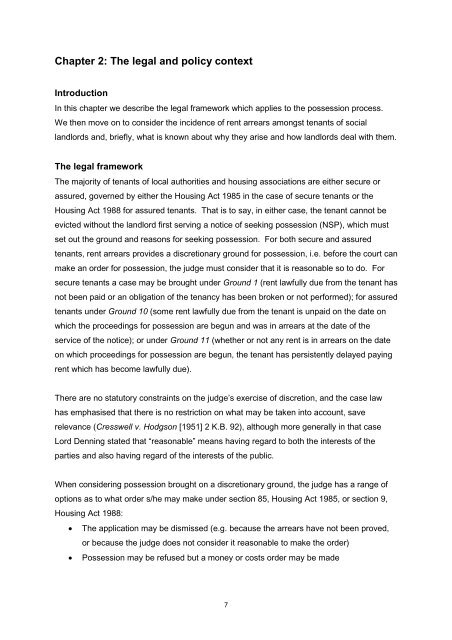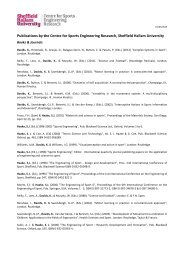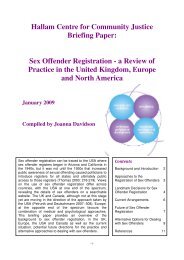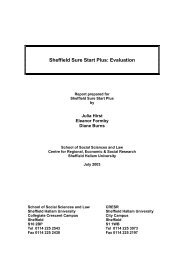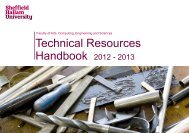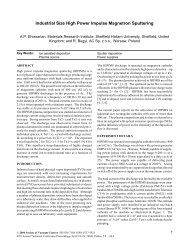The exercise of judicial discretion in rent arrears cases - Sheffield ...
The exercise of judicial discretion in rent arrears cases - Sheffield ...
The exercise of judicial discretion in rent arrears cases - Sheffield ...
Create successful ePaper yourself
Turn your PDF publications into a flip-book with our unique Google optimized e-Paper software.
Chapter 2: <strong>The</strong> legal and policy context<br />
Introduction<br />
In this chapter we describe the legal framework which applies to the possession process.<br />
We then move on to consider the <strong>in</strong>cidence <strong>of</strong> <strong>rent</strong> <strong>arrears</strong> amongst tenants <strong>of</strong> social<br />
landlords and, briefly, what is known about why they arise and how landlords deal with them.<br />
<strong>The</strong> legal framework<br />
<strong>The</strong> majority <strong>of</strong> tenants <strong>of</strong> local authorities and hous<strong>in</strong>g associations are either secure or<br />
assured, governed by either the Hous<strong>in</strong>g Act 1985 <strong>in</strong> the case <strong>of</strong> secure tenants or the<br />
Hous<strong>in</strong>g Act 1988 for assured tenants. That is to say, <strong>in</strong> either case, the tenant cannot be<br />
evicted without the landlord first serv<strong>in</strong>g a notice <strong>of</strong> seek<strong>in</strong>g possession (NSP), which must<br />
set out the ground and reasons for seek<strong>in</strong>g possession. For both secure and assured<br />
tenants, <strong>rent</strong> <strong>arrears</strong> provides a <strong>discretion</strong>ary ground for possession, i.e. before the court can<br />
make an order for possession, the judge must consider that it is reasonable so to do. For<br />
secure tenants a case may be brought under Ground 1 (<strong>rent</strong> lawfully due from the tenant has<br />
not been paid or an obligation <strong>of</strong> the tenancy has been broken or not performed); for assured<br />
tenants under Ground 10 (some <strong>rent</strong> lawfully due from the tenant is unpaid on the date on<br />
which the proceed<strong>in</strong>gs for possession are begun and was <strong>in</strong> <strong>arrears</strong> at the date <strong>of</strong> the<br />
service <strong>of</strong> the notice); or under Ground 11 (whether or not any <strong>rent</strong> is <strong>in</strong> <strong>arrears</strong> on the date<br />
on which proceed<strong>in</strong>gs for possession are begun, the tenant has persistently delayed pay<strong>in</strong>g<br />
<strong>rent</strong> which has become lawfully due).<br />
<strong>The</strong>re are no statutory constra<strong>in</strong>ts on the judge’s <strong>exercise</strong> <strong>of</strong> <strong>discretion</strong>, and the case law<br />
has emphasised that there is no restriction on what may be taken <strong>in</strong>to account, save<br />
relevance (Cresswell v. Hodgson [1951] 2 K.B. 92), although more generally <strong>in</strong> that case<br />
Lord Denn<strong>in</strong>g stated that “reasonable” means hav<strong>in</strong>g regard to both the <strong>in</strong>terests <strong>of</strong> the<br />
parties and also hav<strong>in</strong>g regard <strong>of</strong> the <strong>in</strong>terests <strong>of</strong> the public.<br />
When consider<strong>in</strong>g possession brought on a <strong>discretion</strong>ary ground, the judge has a range <strong>of</strong><br />
options as to what order s/he may make under section 85, Hous<strong>in</strong>g Act 1985, or section 9,<br />
Hous<strong>in</strong>g Act 1988:<br />
<strong>The</strong> application may be dismissed (e.g. because the <strong>arrears</strong> have not been proved,<br />
or because the judge does not consider it reasonable to make the order)<br />
Possession may be refused but a money or costs order may be made<br />
7


